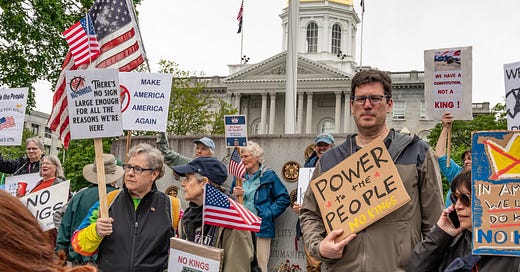Is this déjà vu all over again?
Is this déjà vu all over again?
Is this déjà vu all over again? Look at the similarities between what’s happening today and the 1960s: America is again divided between two warring ideologies, the National Guard is being deployed against demonstrators, and the president is abusing his power.
Serge Schmeman recently wrote in the NYT that “the big difference is in the spirit of the times, the sense back then that change was possible and today that doors are being closed.”
I agree that the 1960s were fueled by hope and idealism, and for me personally, it represented freedom, an escape from the death grip of what came before.
Looking back on it, growing up in the 1950s felt like a stifling straitjacket, not the carefree, idealized world of “Leave it to Beaver” and “Father Knows Best.” I was one of the lucky ones, a middle-class, white boy, but even as that privileged kid, I knew something was wrong.
Things like McCarthy’s reign of terror, blacklisting liberals he accused of being Communists, led my father to confide in me when I was little that I should always be careful about what I tell people because it could come back to ruin my life.
A quick aside to describe the political climate in NH during that era:
William Loeb was the ultra-conservative publisher of the Manchester Union Leader, by far the most influential news voice in New Hampshire. Loeb was a henchman of McCarthy and was in cahoots with the John Birch Society, an organization so far right that it accused President Eisenhower of treason for being a communist.1
Not surprisingly, Meldrim Thompson, a three-time governor of NH, was a close ally of Loeb. He is perhaps best known for his “Axe the Tax” campaign, which haunts NH to this day, and for attempting to arm the NH National Guard with nuclear weapons at a time when protestors were trying to shut down the Seabrook Nuclear Reactor.
Now back to my childhood: I remember my feelings of imminent doom in grammar school, waiting for the Russian atomic bombs to fall while crouching under my desk at school in “duck and cover” drills, while neighbors were building bomb shelters.
When I got older, I recall being baffled about why I was taunted as queer if I patted a male friend on the back or wore yellow on Thursdays. And the biggest prohibition of them all, as if etched on a tablet by God Himself: No sex before marriage.
The whole gamut of my childhood milieu generated in me a confused and incoherent rage, which I released by hard drinking and carousing with the wild crowd. It was only after serving in Vietnam that I was able to put my finger on the source of my torment.
Unfortunately, for slow learners like me, it required taking part in a murderous assault on Vietnam for it to sink in what an oppressive atmosphere I had been nurtured in: it opened my eyes to see my childhood movie hero, John Wayne, for who he really was: A slaughterer of Native Americans – just as we were slaughtering indigenous people in Asia.
Joining the anti-war movement was like a breath of fresh air and an instant education: as my mask of denial fell away, I was sensitized to the discrimination that my new black, brown and gay friends endured daily.
And then there was the largest group of all, grossly discriminated against and shunted to the shadows: I’m talking about women, relegated to running the mimeograph machines for the peace movement in the beginning, but, who also saw the light and rebelled, demanding to be equal partners, beginning a fight for their own liberation.
Yes, the Sixties spelled liberation for us all
Consequently, as Frank Senso, former CNN Washington bureau chief, has written, “we live in a far more open, inclusive, tolerant, and equal America than at any other time in our history”2.
But today, that is all at risk.
As Leonard Steinhorn has warned in Salon Magazine, Donald Trump is not just waging battles against the press, immigrants, voting rights, the environment, science, social welfare programs, Planned Parenthood and the deep state.“These are mere skirmishes in a much larger conflict. The president has essentially declared an all-out war on the American 1960s.3
But as our mass protests prove – like our “No Kings Day” rally last week – we, the People, refuse to go back to the dark ages of the 1950s..
xxx
Footnotes:
1 https://www.slate.com/articles/news_and_politics/politics/2016/05/
3 https://www.salon.com/2017/07/29/donald-trumps-war-on-the-1960s_partner/






